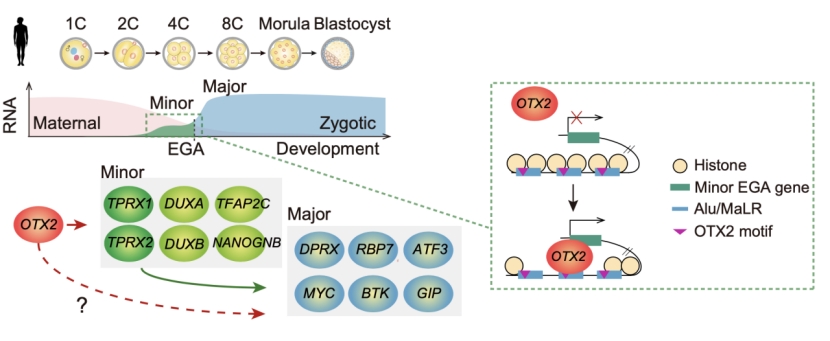A joint team led by Prof. Wei Xie at Tsinghua University, Prof. Zi-Jiang Chen and Prof. Han Zhao from Shandong University, discovered that OTX2, a maternal transcription factor, plays an essential role in initiating embryonic genome activation (EGA) in human. By revealing the key factor regulating the first gene activity in human life, the research provides important insights into the earliest regulatory events that initiate the human development and offers valuable implications for reproductive and developmental biology.
EGA marks the first transcription event in a new life and the onset of the embryonic program. However, the molecular basis of this process in humans has remained poorly understood due to the extremely limited research materials. This new study identified OTX2, a PRD-like homeobox protein which is highly translated before human EGA, as a crucial maternal regulator of this event. OTX2 belongs to an ancient Otx gene family present across metazoans. This family also includes two other transcription factors, OTX1 and CRX. Interestingly, during the evolution of eutherian mammals, CRX gaves rise to several additional PRD-like homeobox genes, such as the TPRX family in humans and the OBOX family in mice. Recent studies have shown that these two families play important roles in zygotic genome activation (ZGA) in humans and mice (1-2), respectively.
When OTX2 was depleted by a combined method using Trim-Away, siRNA, and Morpholino, embryos exhibited clear developmental defects toward the morula stage. Through single-embryo RNA-seq, low-input CUT&RUN and ATAC-seq, the researchers showed that OTX2 directly binds regulatory regions of key EGA genes at the 4-cell stage, such as TPRX1, TPRX2, and the EGA-associated repeat HERVL, to promote chromatin accessibility and gene activation. The team also discovered that OTX2 preferentially binds repetitive DNA elements, including Alu and MaLR sequences, that are preferentially present near ZGA genes, raising a possibility that repetitive elements may act as cis-regulatory elements for EGA contribute to the earliest gene regulation in human embryos. Importantly, the transcriptome and developmental defects upon OTX2 depletion could be partially rescued by overexpression of TPRX1/2, two downstream targets of OTX2. Moreover, the research showed that the regulation by OTX2 on gene expression and chromatin accessibility extends to the 8C stage in concert with another maternal PRD-like TF TPRXL, hence establishing an OTX2/TPRXL-TPRX1/TPRX2 hierarchical regulatory circuitry in early human development.
By elucidating how OTX2 initiates the first wave of human gene expression, this study deepens our understanding of the molecular foundations of early development and offers insights for improving assisted reproductive technologies and treatment of infertility. OTX2’s role in awakening the human genome also suggests that the Otx family’s involvement in genome activation may represent a deeply conserved mechanism controlling mammalian ZGA.
Prof. Wei Xie from School of Life Science at Tsinghua University, and Prof. Zi-Jiang Chen and Prof. Han Zhao from Institute of Women, Children and Reproductive Health at Shandong University are the co-corresponding authors of this work. Dr. Qiuyan Wang from School of Life Sciences at Tsinghua University and Dr. Chuanxin Zhang from Institute of Women, Children and Reproductive Health at Shandong University are the co-first authors of this work. This work was supported by State Key Laboratory of Reproductive Medicine and Offspring Health and National Research Center for Assisted Reproductive Technology and Reproductive Genetics at Shandong University, and Animal Center and Biocomputing Facility at Tsinghua University. This work was funded by the National Key R&D Program of China, the National Natural Science Foundation of China (NSFC), the Excellence Research Group Program of NSFC, the Tsinghua-Peking Center for Life Sciences, and the Fundamental Research Funds of Shandong University. Wei Xie is a recipient of the HHMI International Research Scholar award and the New Cornerstone Investigator award.
The study is published in Nature Genetics on October 27, 2025 as a research article, under the title “Maternal factor OTX2 regulates human embryonic genome activation and early development.” The link is as follows: https://www.nature.com/articles/s41588-025-02350-8.
Figure 1. A model illustrating the regulation of human EGA by the transcription factor OTX2.

References:
1.Zou, Z., et al. (2022). "Translatome and transcriptome co-profiling reveals a role of TPRXs in human zygotic genome activation." Science 378(6615): abo7923.
2.Ji, S., et al. (2023). "OBOX regulates mouse zygotic genome activation and early development." Nature 620(7976): 1047-1053.
